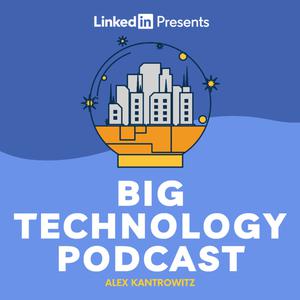
Invisible Machines podcast by UX Magazine
Invisible Machines
UX Magazine presents the Invisible Machines podca…
- 1 hour 25 secondsRadically Honest AI with Dr. Anna Lembke
Anna Lembke, MD, author of the New York Times bestseller Dopamine Nation: Finding Balance in the Age of Indulgence, joins Robb and Josh for a discussion about the perils and promise of AI. As a psychiatrist and Chief of the Stanford Addiction Medicine Dual Diagnosis Clinic at Stanford University, Dr. Lembke shares critical insights into the power and nature of behavioral addiction, and how technology and digital media are impacting the dopamine systems in our brains. Drawing from her experience with patients, she shares the concept of radical honesty—a cornerstone of addiction recovery. Together, they explore how radically honest AI could pose less of a threat and help establish healthier boundaries around technology use.
In this episode, we mention:
- Dr. Anna Lemble’s book “Dopamine Nation: Finding Balance in the Age of Indulgence”: https://www.amazon.com/Dopamine-Nation-Finding-Balance-Indulgence/dp/152474672X
- The forthcoming revised and updated 2nd edition of Robb Willson and Josh Tyson’s bestselling book, “Age of Invisible Machines: A Practical Guide to Creating a Hyperautomated Ecosystem of Intelligent Digital Workers”: https://www.amazon.com/Age-Invisible-Machines-Orchestrating-Organizations/dp/1394321554
- Dr. Anna Lembke’s “The Official Dopamine Nation Workbook: A Practical Guide to Finding Balance in the Age of Indulgence”: https://www.amazon.com/Official-Dopamine-Nation-Workbook-Indulgence/dp/0593476212?sr=1-1
- Pew Research Center survey of U.S. teens ages 13 to 17 conducted Sept. 18-Oct.10, 2024: "Teens, Social Media, and Technology 2024": https://www.pewresearch.org/internet/2024/12/12/teens-social-media-and-technology-2024/
Learn about creating and orchestrating AI agents for your team:
#AI
#AIPodcast
#TechPodcast
#InvisibleMachines
#ArtificialIntelligence
#AIAgents
#AgenticAI
#TechInnovation
#DopamineNation
#RadicalHonesty
#DigitalAddiction
#MentalHealth
#TechImpact
#BehavioralScience
#Dopamine
#AnnaLembke
17 January 2025, 5:29 pm - 1 hour 40 secondsS4E16 How do human brains inform “thinking” machines, with Dr. Thomas Parr
Active inference is a “first principles” approach to understanding behavior and the brain, framed in terms of a single imperative to minimize free energy. The free energy principle describes systems that pursue paths of least surprise, minimizing the difference between predictions based on their model of the world and their sense and associated perception.
Dr. Thomas Parr is a practicing clinician and prominent researcher in the field of theoretical neuroscience and he currently works as an NIHR Academic Clinical Fellow in Neurology at the University of Oxford’s Nuffield Department of Clinical Neurosciences. He is also a co-author of Active Inference: The Free Energy Principle in Mind, Brain, and Behavior, written in collaboration with Giovanni Pezzulo and Karl J. Friston.
In this episode, we mention:
- Thomas Parr’s book “Active Inference: The Free Energy Principle in Mind, Brain, and Behavior (co-written with Giovanni Pezzulo and Karl J. Friston): https://www.penguinrandomhouse.com/books/704196/active-inference-by-thomas-parr-giovanni-pezzulo-and-karl-j-friston/
- Troxler's fading: https://en.wikipedia.org/wiki/Troxler%27s_fading
- The Invisible Machines episode “Digital Natives Are Now AI Immigrants” with Marc Prensky: https://youtu.be/CAKumte_JP8?si=OxPKZbRKIegEjBvh
- Landauer's principle: https://en.wikipedia.org/wiki/Landauer%27s_principle
Learn about orchestrating AI agents for your team:
#aipodcast
#techpodcast
#invisiblemachines
#ai
#artificialintelligence
#aiagents
#agenticai
#techinnovation
#neuroscience
#activeinference
#machinelearning
#congitivescience
#behavioralscience
#futureofai
#neuroai
#thinkingmachines
20 December 2024, 8:50 pm - 52 minutes 53 secondsS4E15 Computer Vision In Action
Despite being a massive piece of the bigger AI puzzle, computer vision doesn’t always get the recognition it deserves. Robb and Josh welcome Dr. Jason Corso, Professor of Robotics at University of Michigan for an In Action episode that explores the complexity and power of machines that can see.
Jason is the Co-Founder and Chief Science Officer of Voxel51, which is backed by Bessemer Venture Partners, and in this episode he demonstrates open-source tools available for working with massive datasets that include images and videos. The trio also discuss the border implication of adding the context that vision can afford to multi-agent systems.
Explore Dr. Jason Corso’s Voxel51 platform: https://voxel51.com/
- FiftyOne Open Source: Voxel51's open source toolkit for building high-quality datasets and computer vision models.
- FiftyOne Teams: Voxel51’s commercial offering based on open source FiftyOne.
- People can try FiftyOne at try.fiftyone.ai.
- Voxel51 on Github: https://github.com/voxel51/fiftyone
- A course on Coursera that Voxel51 created called "Hands-on Data Centric Visual AI" — https://www.coursera.org/learn/hands-on-data-centric-visual-ai
Learn about orchestrating AI agents for your team:
AI agent landing page with the whitepaper: https://onereach.ai/ai-agents/?utm_source=soundcloud+&utm_medium=social&utm_campaign=computer_vision_in_action_episode&utm_content=1
Learn about the only tools for orchestrating AI agents that are named a leader by all major analyst firmsAI agent landing page (dev): https://aiagents.onereach.ai/?utm_source=soundcloud&utm_medium=social&utm_campaign=computer_vision_in_action_episode&utm_content=1
#AIPodcast
#TechPodcast
#InvisibleMachines
#AI
#ArtificialIntelligence
#AIAgents
#AgenticAI
#ComputerVision
#MultiAgentSystems
#DataScience
#TechInnovation
#AIinAction
#GenerativeAI
#NoCode
#Automation
#DigitalTransformation
#AITech
6 December 2024, 7:06 am - 30 minutes 21 secondsS4E14 AI Agent Building in Action
What’s it like to build an AI agent? Daniel Lametti, Associate Professor of Psycholinguistics at Acadia University, Visiting Fellow at the University of Oxford, and Senior Academic Advisor to OneReach.ai, returns to Invisible Machines to demonstrate how easy it can be to create and iterate on AI agents.
Like other In Action episodes, you’ll watch as we walk through the practical realities of building these systems. This time, see how professor Daniel Lametti creates an objective-based AI agent that helps users craft and send emails. Though he’s hesitant to think of himself as one, conversational technologies have made Daniel a deft software developer.
In this In Action episode, Daniel shares his experiences building AI agents with Robb and Josh. The trio discuss and show how coding languages are moving further into the background as machines become more adept at communicating in human language.
Follow Daniel Lametti’s work: https://psychology.acadiau.ca/daniel-lametti.html
Learn about orchestrating AI agents for your team:
#AIPodcast
#TechPodcast
#InvisibleMachines
#AI
#ArtificialIntelligence
#AIAgents
#AgenticAI
#GenerativeAI
#LLMs
#ConversationalAI
#InAction
#NoCode
#Automation
#DigitalTransformation
#NaturalLangiageProcessing
#Email
#SoftwareDevelopment
#FutureofAI
#UXDesign
#MachineLearning
#AITech
26 November 2024, 4:34 pm - 51 minutes 29 secondsS4E13 Are generative AI tools unlawful to use?Robb and Josh are joined by Ed Klaris, Managing Partner at Klaris Law, Columbia Law professor, and CEO of KlarisIP, for a conversation about the fate of generative tools like LLMs and AI models that produce audio and video. From Ed’s viewpoint, giant tech companies used stolen content to train the powerful AI models that have quickly changed the world around us. The trio discuss the question of whether or not it’s lawful for us all to use generative AI tools and how IP and copyright law will impact, and be impacted by generative AI. As we wait for landmark decisions that will determine the fate of these tools, this conversation with Ed Klaris offers context and food for thought, and for some maybe even a sense of alarm. In this episode, we mention: The US Copyright Office: https://copyright.gov/ The Statute of Anne, also known as the Copyright Act 1710: https://en.wikipedia.org/wiki/Statute_of_Anne Google Books copyright case: https://en.wikipedia.org/wiki/Authors_Guild,_Inc._v._Google,_Inc. AIr Canada AI chatbot case: https://www.forbes.com/sites/marisagarcia/2024/02/19/what-air-canada-lost-in-remarkable-lying-ai-chatbot-case/ Follow Ed Klaris's work: https://www.klarislaw.com/ Learn about orchestrating AI agents for your team: https://onereach.ai/ai-agents/?utm_source=soundcloud&utm_medium=social&utm_campaign=copyright_law_episode&utm_content=1 #AIPodcast #TechPodcast #InvisibleMachines #AI #ArtificialIntelligence #AIAgents #AgenticAI #GenerativeAI #LLMs #IntellectualProperty #CopyrightLaw #AIEthics #TechLaw #AIRegulation #DigitalTransformation #Innovation #FutureofAI #AIandIP #LegalTech #AITransparency12 November 2024, 12:27 pm
- 36 minutes 48 secondsS4E12 Designing a Future for AI NativesJieun Kiaer is the Professor of Korean Linguistics at Oxford and her new book, The Future of Syntax: Asian Perspectives in an AI Age, explores the complexity within Chinese, Japanese, and Korean languages, arriving at insights that veer away from traditional approaches to formal syntax. The book also revisits Marc Prensky’s “digital native” concept, laying the groundwork for a new generation of technology users, “AI natives.” Jieun joins Robb and Josh for a conversation about the promise and peril of radical new technologies in classroom settings and how we might shift our focus to designing a positive future for AI natives. In this episode, we mention: Jieun Kiaer’s book “The Future of Syntax: Asian Perspectives in an AI Age”: https://www.bloomsbury.com/us/future-of-syntax-9781350258273/ Follow Jieun Kiaer’s work: https://www.ames.ox.ac.uk/people/jieun-kiaer Learn about orchestrating AI agents for your team: https://onereach.ai/ai-agents/?utm_source=soundcloud&utm_medium=social&utm_campaign=future_for_ai_natives_episode&utm_content=1 #AIPodcast #TechPodcast #InvisibleMachines #AI #ArtificialIntelligence #AIAgents #DigitalTransformation #Innovation #AIInEducation #DigitalNatives #AINatives #FutureOfLearning #TechnologyInClassrooms #AIandEducation #AsianLanguages #Linguistics #TechnologyInEducation #LanguageLearning ##JieunKiaer31 October 2024, 11:36 pm
- 37 minutes 42 secondsS4E11 Digital Natives Are Now AI ImmigrantsMarc Prensky is widely known for coining the terms “digital native” and “digital immigrant”—both now in the Oxford English Dictionary. In this episode, Marc joins Josh for a conversation about the shortcomings of our current education system and how AI might help inspire and enable a new generation of "AI natives" to design their own future. The two discuss the challenges that companies face in adjusting to this new technology paradigm, as well as the potential benefits and risks that conversant machines bring to society. As an eternal optimist, Marc shares his vision of how young people in the third millennium might view productivity and purpose. Marc and Josh also debate the role smartphones play in the classroom of the future, and agree that the world needs more love, empathy, gratitude, and optimism. In this episode, we mention: Marc Prensky’s book “Third Millennium Kids: A Hell Yes! Low Stress Guide For Everyone”: https://www.amazon.com/Third-Millennium-Kids-Stress-Everyone/dp/B0DC3J8XV6 Learn more about Marc Prensky: marcprensky.com Learn about orchestrating AI agents for your team: SoundCloud: https://onereach.ai/ai-agents/?utm_source=soundcloud&utm_medium=social&utm_campaign=digital_natives_episode&utm_content=1 YouTube: https://onereach.ai/ai-agents/?utm_source=youtube&utm_medium=social&utm_campaign=digital_natives_episode&utm_content=1 #AIPodcast #TechPodcast #InvisibleMachines #AI #ArtificialIntelligence #ConversationalAI #AIAgents #TechInsights #DigitalTransformation #TechTalk #Innovation #DigitalNatives #AIInEducation #FutureOfLearning #TechnologyInClassrooms #MarcPrensky #AINatives17 October 2024, 8:42 pm
- 1 hour 20 minutesS4E10 Is AI the End of Companies?With consumer use of AI technology outpacing enterprise adoption, the fear of companies using AI to get rid of employees has been flipped on its head into legitimate threat to the existence of companies as we know them. There’s nothing preventing consumers from using generative tools to disrupt large companies—for example, using a fleet of AI agents to flood and debilitate a call center to take advantage of a promotion. Harsha Gowda and Nitin Bhudia, respectively the CTO and Director of Innovation at Getronics, join Robb and Josh to discuss the risk organizations take by dragging their feet in the race for AI adoption. This conversation explores how organizations can embrace “artificial incompetence” as a necessary initial phase on the course to artificial intelligence, and seed the velocity that will transform their operations. By using AI agents to create an abstraction layer over existing solutions, organizations can take control of their futures. In this episode, we mention: The Invisible Machines episode “Digital Twins in an Agentic World” with Dr. Michael Grieves, the father of Digital Twins: https://www.youtube.com/watch?v=KsL3w2bVjmw The TV series “Fawlty Towers”: https://www.imdb.com/title/tt0072500/ Learn more about Getronics: https://www.getronics.com/ Discover how to succeed with an agentic approach to software: https://onereach.ai/ai-agents/?utm_source=soundcloud&utm_medium=social&utm_campaign=ai_and_companies_episode&utm_content=1 #AIPodcast #TechPodcast #InvisibleMachines #AI #ArtificialIntelligence #ConversationalAI #AIAgents #TechInsights #DigitalTransformation #TechTalk #Innovation #GenerativeAI #BusinessStrategy #AIAdoption #OrganizationalAGI1 October 2024, 7:00 am
- 1 hour 8 minutesS4E9 Digital Twins in an Agentic WorldDigital twins are critical to the orchestration of AI agents, providing the context they need to create meaningful experiences quickly and efficiently. Robb and Josh welcome Dr. Michael Grieves for a conversation about the origins of the concept, which he developed while working with NASA in the 2010s. The architecture required for orchestrating AI agents relies on different types of digital twins that may emerge within an organization, touching on physical elements, temporal data, and collections of unstructured data. Dr. Grieves joins the podcast to explore these connections, drawing from his book Product Lifecycle Management as well as his numerous scientific publications. The trio also discusses how something Michael calls “retirementitus” prevents organizations from embracing the sweeping technologies surrounding AI and digital twins. In this episode, we mention: Dr. Michael Grieves’ book “Product Lifecycle Management: Driving the Next Generation of Lean Thinking”: https://www.amazon.com/Product-Lifecycle-Management-Generation-Thinking/dp/0071452303 Dr. Michael Grieves’ book “Digital Twins, Simulation, and the Metaverse: Driving Efficiency and Effectiveness in the Physical World through Simulation in the Virtual Worlds (Simulation Foundations, Methods and Applications): https://www.amazon.com/Digital-Twins-Simulation-Metaverse-Effectiveness/dp/3031691067 The Invisible Machines episode “Building an Advanced Digital Assistant” with Jeff McMillan (Head of AI) and David Wu (Head of Knowledge Management & Generative AI) at Morgan Stanley: https://www.youtube.com/watch?v=3iQbufK1luE&t=1567s Charles Perrow’s book “Normal Accidents: Living with High Risk Technologies: https://www.perlego.com/book/735258/normal-accidents-living-with-high-risk-technologies-updated-edition-pdf The Invisible Machines episode with Dr. Nathan Price, Chief Scientific Officer of Thorn HealthTech, and Dr. Lee Hood, a world-renowned scientist, a recipient of the National Medal of Science, and a key contributor to the human genome project: https://www.youtube.com/watch?v=rrrEu5TNqFg The Invisible Machines episode “Lean Knowledge Management” with Roger Forsgren, former Chief Knowledge Officer at NASA: https://www.youtube.com/watch?v=e4A_JiBRCr8 You can learn more about orchestrating AI agents for your team: https://onereach.ai/ai-agents/?utm_source=soundcloud&utm_medium=social&utm_campaign=digital_twins_episode&utm_content=1 #AIPodcast #TechPodcast #InvisibleMachines #AI #ArtificialIntelligence #ConversationalAI #AIAgents #TechInsights #DigitalTwins #AIOrchestration #ProductManagement #TechInnovation #DataArchitecture #MichaelGrieves #FutureOfAI #TechTalk20 September 2024, 12:30 am
- 1 hour 4 minutesS4E8 Will We Ever Love Using Software?As AI agents continue to alter the way people interface with technology, Robb and Josh were eager to speak with journalist Matt Alston about his popular Business Insider article “Everyone hates Workday.” In this deep exploration of our multifaceted interactions with machines, Matt reminds us that Workday’s UX is different across a whole spectrum of users, and that generally speaking, people don’t like using software. The patterns we follow when operating software end up shaping our thinking, and as we move into a world dominated by conversational interfaces, it’s important to consider the way these systems are intertwined with our minds. Don’t miss this eye-opening episode about the future of project management. Learn more about creating and orchestrating AI agents to streamline your business operations: https://onereach.ai/ai-agents/?utm_source=soundcloud&utm_medium=social&utm_campaign=matt_alston_episode&utm_content=1 Article, “Everybody hates Workday”: businessinsider.com/everyone-hates-workday-human-resources-customer-service-software-fortune-500-2024-5 Learn more about Matt Alston: mattalston.com. #AIPodcast #InvisibleMachines #AI #ArtificialIntelligence #ConversationalAI #AIAgents #UXDesign #Workday #ProjectManagement #FutureOfWork #UserExperience #SoftwareDevelopment #TechInsights12 September 2024, 9:05 pm
- 1 hour 12 minutesS4E7 Are AI Agents the End of SaaS?As AI agents continue to remake the way we communicate with machines, what will become of SaaS companies? In this episode, Robb and Josh are joined by Janelle Teng, Vice President at Bessemer Venture Partners’ San Francisco office, who recently noted that “2024 has not been kind to SaaS companies” on her Next Big Teng blog. A Stanford scientist and former product manager at Salesforce, Janelle explains why she is bullish on the multi-agent approach to automation. The trio also discuss the ramification of consumer adoption of AI outpacing enterprises and why startups have a clear advantage in this moment. Discover how to design and orchestrate conversational AI agents for your employees and customers: https://onereach.ai/ai-agents/?utm_source=soundcloud&utm_medium=social&utm_campaign=janelle_teng_episode&utm_content=1 Read Jenelle’s insights at nextbigteng.substack.com. #AIPodcast #InvisibleMachines #AI #ArtificialIntelligence #ConversationalAI #AIAgents #SaaS #Automation #TechTrends #Innovation #BusinessStrategy #AIstartups #VC #AIcapital5 September 2024, 9:04 pm
- More Episodes? Get the App
Your feedback is valuable to us. Should you encounter any bugs, glitches, lack of functionality or other problems, please email us on [email protected] or join Moon.FM Telegram Group where you can talk directly to the dev team who are happy to answer any queries.
 Greymatter
Greymatter
 Design Better
Design Better
 Big Technology Podcast
Big Technology Podcast
 Lenny's Podcast: Product | Growth | Career
Lenny's Podcast: Product | Growth | Career
 a16z Podcast
a16z Podcast
 UI Breakfast: UI/UX Design and Product Strategy
UI Breakfast: UI/UX Design and Product Strategy